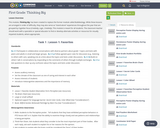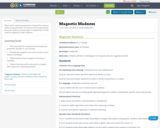
OverviewThe purpose of Thinking Big is to immerse students in a series of research-based cognitive behaviors that are foundational to school and life success: creativity, logical reasoning, memory, and spatial reasoning.Thinking Big was developed by Frederick County Public Schools and is made up of single-day experiences designed to instruct students in the behaviors and elicit them without additional prompting. While arranged in order of difficulty, lessons may also serve as “stand-alone” experiences throughout the year grouped by cognitive focus. Most lessons use mathematical thinking prompts and manipulatives. The focus of the unit is not on math, but on thinking and reasoningThe lessons have also been mapped to the relevant gifted behaviors that are taught and observed through the PTD Program. There are two scoring guides: one that allows the observer to record the names of those students who exhibit a command of the cognitive behavior(s); and a REPI-aligned continuum, which allows the observer to note the affective behavior that undergirds a student’s high-level completion of the cognitive behavior. This module is meant for all students. The classroom teacher should work with a specialist or special educator to find or develop alternate activities or resources for visually-impaired students, where appropriate.
- Subject:
- Education
- Material Type:
- Lesson Plan
- Author:
- Amy Tubman
- MSDE Admin
- Bruce Riegel
- Melinda Wilson
- Kathleen Hogan
- Gwen Lewis
- Marcella Brown
- Jessica J. Reinhard
- Kathleen Gregory
- Heidi Strite
- Margaret Lee
- Date Added:
- 07/25/2018
